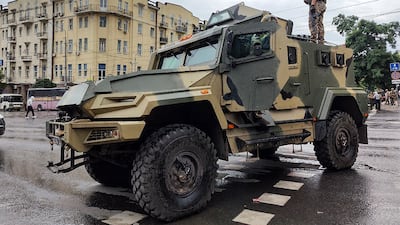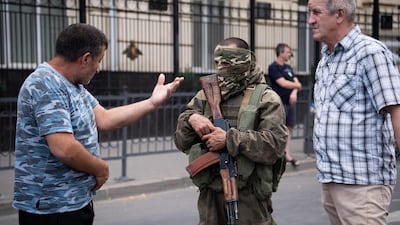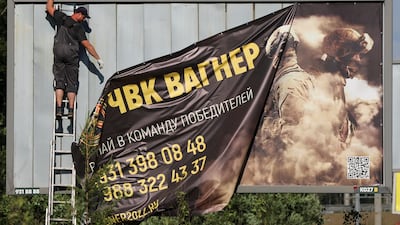US spy agencies picked up signs days ago that Wagner chief Yevgeny Prigozhin was preparing to rise up against Russia's defence establishment, US media reported.
Intelligence officials conducted briefings at the White House, the Pentagon and on Capitol Hill about the potential for unrest in nuclear-armed Russia a full day before it unfolded, the Washington Post and New York Times reported.
Spy agencies first began tracking indications that Mr Prigozhin and his Wagner private military company intended to move against the Russian military leadership in mid-June, the Post said.
The New York Times said the information was both solid and alarming by mid-week, leading to the flurry of briefings.
In an uprising that played out with dizzying speed, Mr Prigozhin's mercenary forces moved from their camps in Ukraine into Russia on Saturday and took over a regional military command in the southern city of Rostov-on-Don before advancing towards Moscow.
Just as suddenly as it began, the advance was called off later on Saturday, with Wagner forces reported to be about 300 kilometres away from Moscow. The Kremlin said Wagner troops would return to Ukraine, while Mr Prigozhin would be allowed to leave for neighbouring Belarus.
The Kremlin said it would not prosecute Mr Prigozhin or the armed members of Wagner.
As US intelligence officials pinned down information that Mr Prigozhin was preparing military action, they grew concerned about chaos in a country with a powerful nuclear arsenal, the Times reported.
According to the Post, the Biden administration did not make public statements or take any action, such as putting forces in Europe on alert, to avoid playing into Moscow's narrative about US-led attempts to weaken Russian security.
US spy agencies believe that Russian President Vladimir Putin was informed that Mr Prigozhin, once a close ally, was plotting his rebellion at least a day before it occurred, the Post reported.
Mr Prigozhin, has been highly critical of Russia's Defence Minister Sergei Shoigu and military chief Valery Gerasimov over the conduct of the war in Ukraine and the lack of support for his fighters in the city of Bakhmut. He cited an alleged attack on his forces by Russian aircraft as the trigger for his revolt, but tensions had been brewing since early June over an order that all volunteers for the war in Ukraine sign contracts with the directly with the defence ministry, according to the Times.
Tatiana Stanovaya, a senior fellow at the Carnegie Endowment for International Peace, told the Times that the move had cut Wagner off from recruits and meant that for the mercenaries to return to the battlefield in Ukraine, Mr Prigozhin would have to subordinate his forces to the defence ministry.
Speaking after Mr Prigozhin called off his advance on Moscow, Kremlin spokesman Dmitry Peskov told journalists that some Wagner forces, including those who had decided against participating in the mutiny, would be able to sign contracts with the defence ministry, the Russian news agency Tass reported on Sunday.
"An agreement was reached that Wagner PMC troops would return to their camps and places of deployment. Some of them, if they wish to do so, can later ink contracts with the Defense Ministry. It also applies to fighters who decided against taking part in this ‘armed mutiny'," Tass quoted Mr Peskov as saying.
He said "there were some fighters in the military formations [of Wagner] who had changed their minds at the very beginning and returned immediately".
Mr Prigozhin’s decision to suddenly halt his march on Moscow has confounded experts and angered some Wagner supporters, according to Colin Clarke, director of research at the Soufan Group.
“He's been slinging arrows at the highest-ranking Russian military officers from day one, he's been a pain in the butt and this is just, I think, a bridge too far,” Mr Clarke told The National.
“I really don't see how he recovers.”
Despite halting his advance on Moscow, the Russian mercenary chief has tarnished Mr Putin’s image.
“He's exposed Putin as vulnerable, he's embarrassed him,” said Mr Clarke. “He's displayed for everyone to see the real fissures in Russian command and control.”







